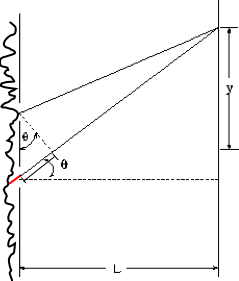I know that when light from a laser is reflected from a rough surface onto a screen, it produces a speckle pattern.
I believe, a Fourier transform of the intensity distribution of the speckle pattern can be used to study the different interference patterns that make up the speckle pattern.
I was told that any two points on the rough surface separated by a distance $d$ contributes to the interference pattern that has a fringe spacing $$y=\frac{\lambda L}{d},$$ where $\lambda$ is the wavelength of the laser and $L$ is the distance from the rough surface to the screen.
However, because two points on any rough surface separated by a distance $d$ are also at different heights, say a difference in height of $x$, wouldn't the fringe spacing for two points points be $$y=\frac{(\lambda-x)L}{d}$$
In the image below, the red line illustrates the distance from the slit to the second point on the rough surface.

